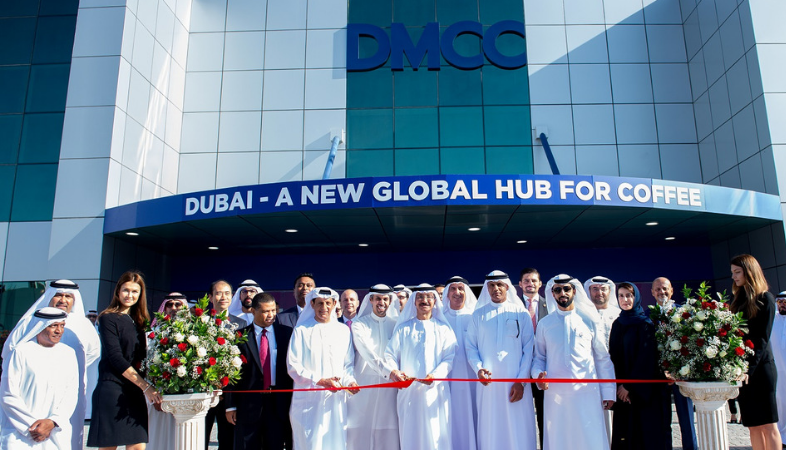- Opening ceremony attended by industry experts, senior dignitaries and officials from coffee producing nations
- The Centre launches during Dubai’s Gulfood - the world's largest annual food and beverage trade exhibition
DMCC – the world’s flagship Free Zone and Government of Dubai Authority on commodities trade and enterprise – inaugurated the ‘DMCC Coffee Centre’ today, a state-of-the-art 7,500m² temperature-controlled facility, and the first of its kind in the Middle East. The Centre launched during Dubai’s Gulfood event, the world's largest annual food and beverage trade exhibition.
From crop to cup, the Centre offers cost-effective logistical support and services that connect producers to buyers. Core services include warehousing, logistics, green coffee cleaning, contract roasting and packing, as well as more specialised offerings for re-bagging of green coffee, sample evaluation and training.
The Centre houses a coffee quality laboratory, cupping labs and a Specialty Coffee Association (SCA) Premier Training Campus, in addition to a range of commercial office space. Projected to handle up to 20,000 tonnes of green coffee bean annually – with an estimated annual trade value of around AED 367 million (USD 100 million) – the Centre is set to attract new trade flows to Dubai and boost the national economy.
A number of senior delegates including H.E. Sultan Ahmed bin Sulayem, Group Chairman and CEO of DP World; H.E. Hamad Buamim, President and CEO Dubai Chamber of Commerce and Industry; H.E. Ahmed Mahboob Musabih, Director of Dubai Customs; H.E. Salem Rashid Al Owais, Ambassador of the UAE to Columbia; H.E. Eduardo Fonseca, Ambassador of Panama to the UAE; and H.E. Ridwan Hassan, Consul General of Indonesia to the UAE attended the official launch in Dubai, and joined a tour of the facility located adjacent to the DMCC Tea Centre in the Jebel Ali Free Zone (Jafza).
“Today represents a significant milestone, and one that places Dubai firmly at the heart of the global coffee trade. First conceptualised in 2016, it is promising to see our vision to serve the market in an entirely different way become a reality,” said Ahmed Bin Sulayem, Executive Chairman, DMCC.
“Dubai is uniquely positioned to serve the significant emerging markets trade corridor of the Middle East, North Africa and South Asia, and well connected to the coffee-producing regions of Africa, China, India, Latin America and South East Asia. The DMCC Coffee Centre will connect international coffee traders with sophisticated logistics, and a host of value-add services, providing operational excellence to meet growing global demand. Until now, the region simply did not have the capacity, equipment or expertise to facilitate global coffee trade on this scale, and we look forward to seeing the impact of our Centre on the industry going forward,” he added.
Dubai’s strategic geographic location offers connectivity between the fast-growing and high-value consumer markets in the Middle East and Europe, to some of the world’s major coffee producing nations such as Ethiopia, India, Indonesia, Uganda and Vietnam. Operational since November 2018, the Centre is set to become the preferred hub for speciality coffee buyers, traders, roasters and producers.
Other services offered by the DMCC Coffee Centre include: three fully outfitted cupping rooms with water to SCA standards; a coffee quality laboratory; a sample (Probat and Ikawa) and small batch (Diedrich) roasters – to assist customers in quality assessment, and shipments of roast and green coffee samples to buyers –; and two Brambati production roasters (30kg and 60kg) – which can accommodate specialty and commercial coffee roasting.
Coffee is one of the world’s most widely consumed hot beverages. The global coffee industry is worth an estimated AED 367.3 billion (USD 100 billion), with the industry in the Middle East expected to climb to AED 16.2 billion (USD 4.4 billion) by 2021, according to Euromonitor.
